Albanian crime gangs in Britain have become so powerful that drugs bosses are openly mocking our soft-touch justice and advertising for cocaine dealers on social media, the Daily Mail can reveal.
Speaking to undercover Daily Mail reporters, 25-year-old Kosovan-Albanian dealer Erik told us he built a network of middle-class cocaine addicts by working in Oxford Street and Soho’s fancy bars.
Smiling and laughing, the drug dealer said he was only recently out of jail for being caught with six bags of cocaine on him.
But despite his brush with the law, he was keen to get back to making money on Britain’s streets.
And, far from getting into the illicit drugs industry through shady underworld figures, Erik had simply posted his phone number on the Facebook group ‘Albanian Community in the UK’, which our investigation can reveal is one of several social media jobs boards commonly used to advertise drug-dealing gigs.
During a half-hour meeting, Erik explained that he was a seasoned drug dealer who sold hundreds of pounds worth of cocaine to customers he met when he was a bartender in Oxford Street and Soho.
When our reporters asked how the police compared to back in his homeland, he said officers in the UK they were far more soft-touch.
‘Here is better police, Erik explained. ‘In the other place, they f***ing smash you. They smash your face. Back home they have everything [including guns]. They shoot.’
Asked if he was afraid of the police in the UK, he shrugged and said: ‘I don’t know what to say man. No.’
Responding to our undercover investigation, Shadow Home Secretary Chris Philp said: ‘This is a damning indictment of Labour’s failure to maintain law and order, organised crime gangs are operating so brazenly they are rubbing our noses in it via social media.
‘These dealers know the risks are low, the penalties are weak, and even if they are deported, they slip back in and carry on wrecking lives. That revolving door is a disgrace.’
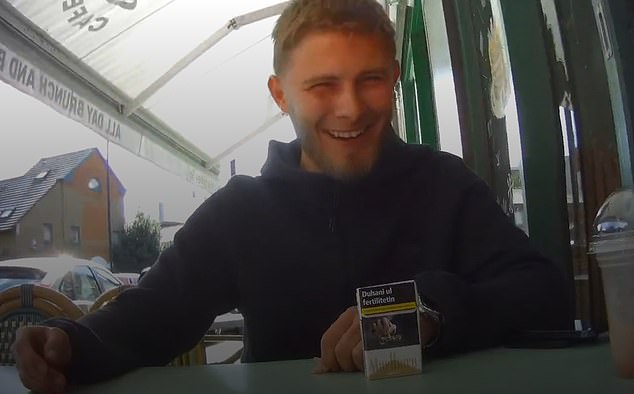
Albanian drug dealer Erik, 25, (pictured) laughed as he spoke to undercover Daily Mail reporters about selling cocaine in London
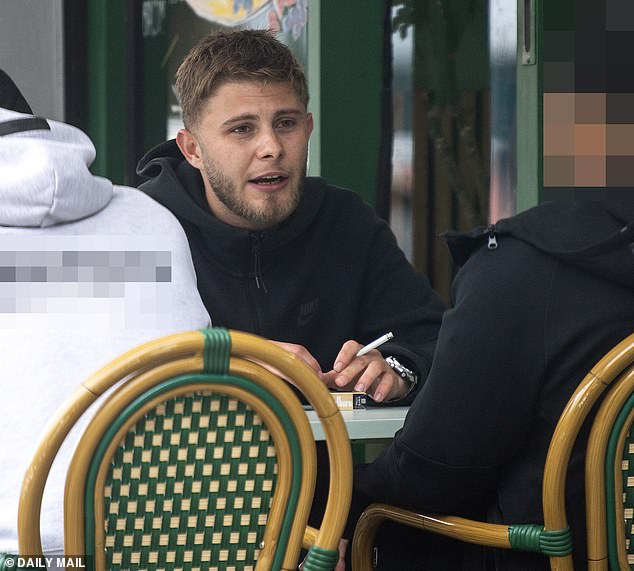
Fiddling with his pack of Albanian cigarettes, he said British police were far more soft-touch than cops back home
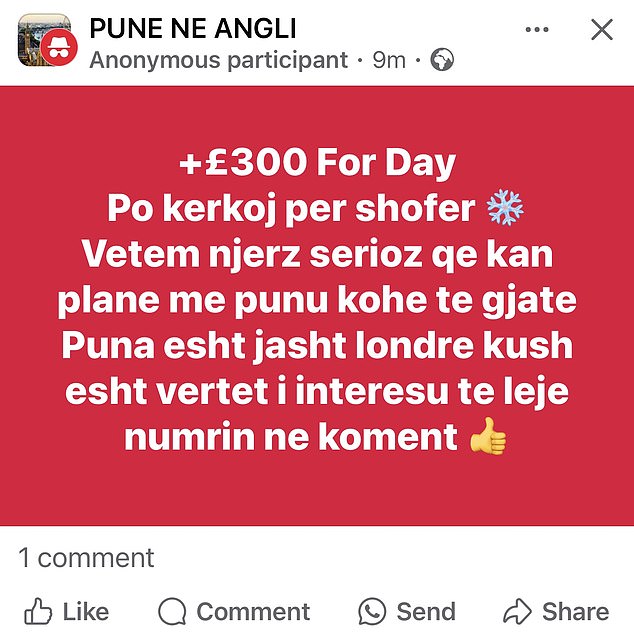
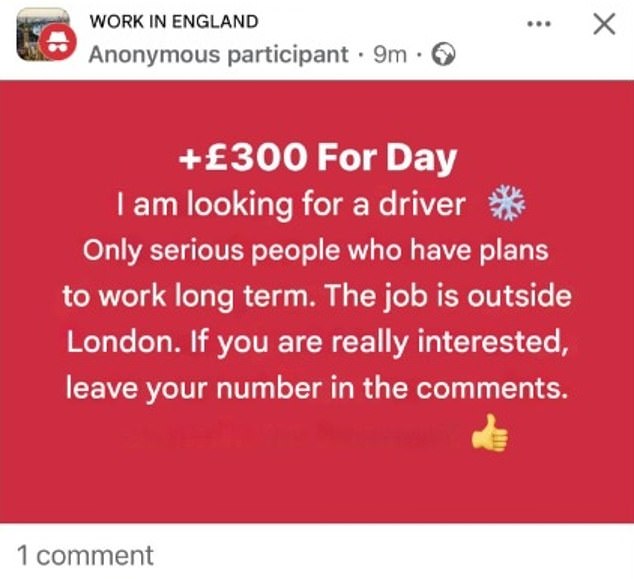
This investigation has also found that Albanian gangsters use Facebook to advertise drug dealing opportunities
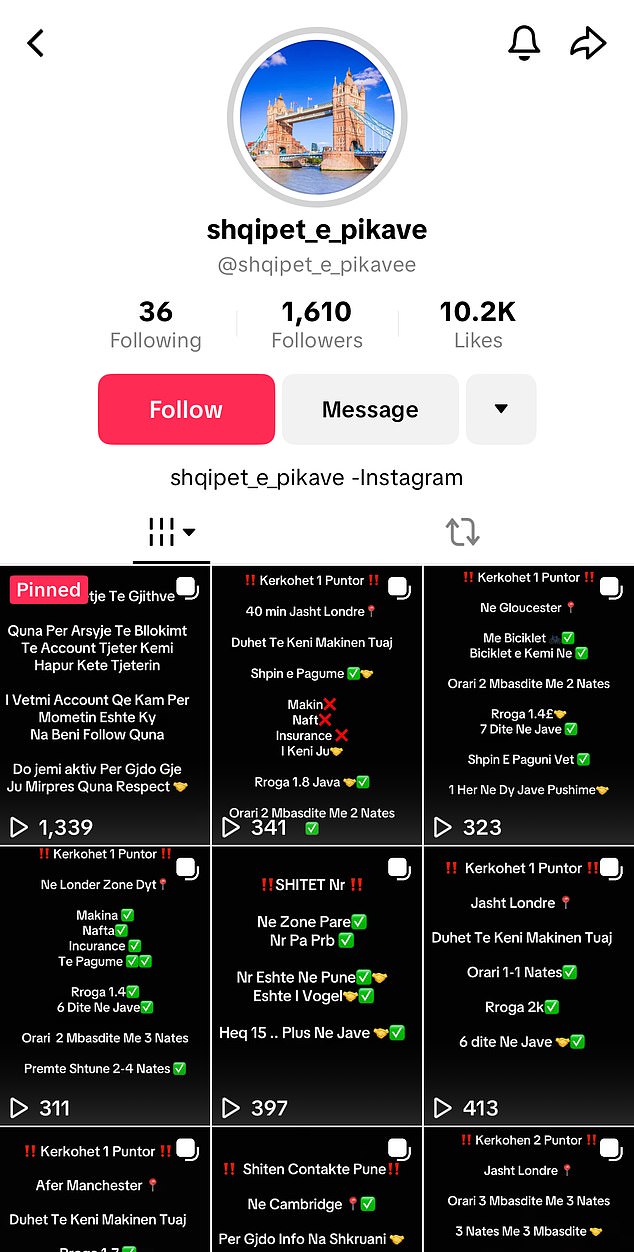
Several Albanian TikTok accounts have also posted job opportunities for cocaine dealers around the UK, such as this one whose name translates as Albanian Points, slang for Albanian Cocaine
Erik’s arrogance and laissez-faire attitude towards the police comes as Albanian gangs continue to dominate the cocaine market in Britain.
The National Crime Agency (NCA) said last year that the Albanian-linked drugs trade was active across the country in cities, towns and even rural areas.
Albanian gangs are smuggling ‘hundreds of millions’ in sterling out of the UK each year.
Erik explained how middle class drinkers in central London were his main clients. Demand is now so high that dealers are now turning to social media to keep up.
The Mail has seen adverts for cocaine dealers across the country, from major cities like Manchester and London to areas less commonly associated with drug dealing, such as Cambridge and Bournemouth.
Our investigation also revealed:
- how Albanian drug gangs are using Facebook and TikTok to advertise jobs for cocaine dealers;
- a secretly-recorded conversation with an Albanian drug dealer laughing at the police and bragging about gangsters using small boats to get into Britain;
- how Albanian gangs are running a cocaine empire with the help of Britain’s broken asylum system;
- where in the UK the Albanian gangs are advertising for cocaine dealers and exactly who these criminals are, named and pictured;
- and how Britain has become so weak that when judges deport drug dealers, they can jump on the next small boat back to commit the very crimes they were booted out for in the first place.
How did Albanian gangs create a cocaine empire in Britain?
Dealers make the least money out of all the mobsters in Albanian gangs. But these criminals on the lowest rung of a gang have wages that are up there with the salaries of CEOs and investment bankers.
That’s because today, the going rate for a dealer in London is £1,700 a week, which adds up to more than £88,000 a year.
However, because dealers don’t pay tax on their illicit income, it’s actually the equivalent of a taxable salary of £145,000 a year, putting Albanian cocaine dealers in the top 1 to 2% of earners nationally in Britain.
The days when gangs like the feared Hellbanianz needed to flash their cash to tempt Albanians into joining their ranks are gone.
These days, newly arrived Albanians are begging their fellow countrymen to let them join.
Albanian drug dealer Erik, 25, was born in Kosovo and moved to the UK three years ago. Despite being arrested multiple times in Albania, he was able to board a plane to the UK and currently has permission to stay in the UK, he said.
Erik said just a few months ago, he was arrested for the first time in Britain by an undercover police officer while on a night out in Chelsea.
He had six bags of cocaine on him, which he told police was for personal consumption. He said he was released from jail after two weeks with no charges and no ankle tag.
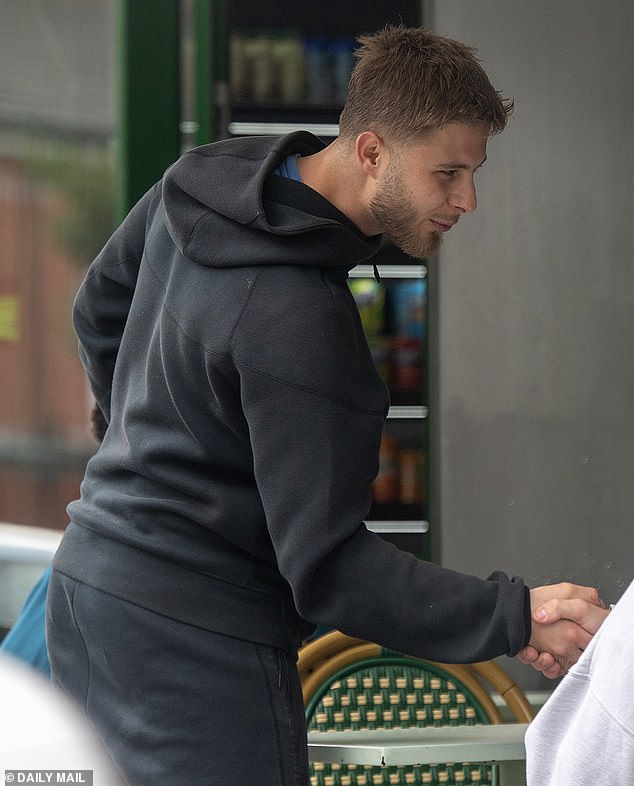
Dressed in a black hoodie and joggers, drug dealer Erik was pleased to meet our undercover reporters, whom he thought were cocaine bosses
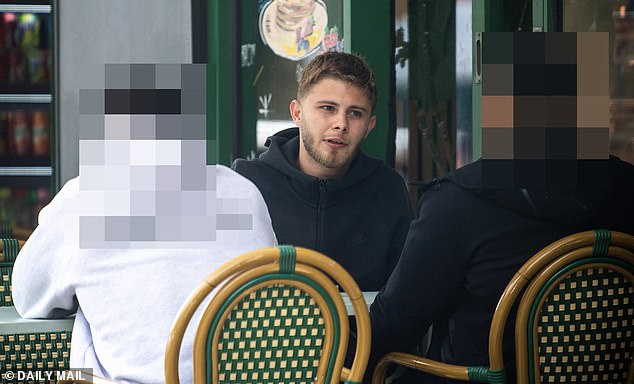
The young man said he used to sell up to £800 of cocaine a day to middle-class drinkers in Oxford Street bars
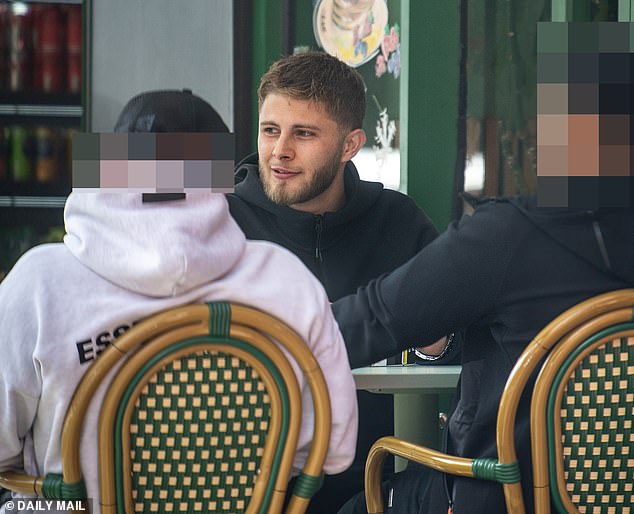
The going rate for an Albanian cocaine dealer in London is £1,700 a week, which adds up to more than £88,000 a year
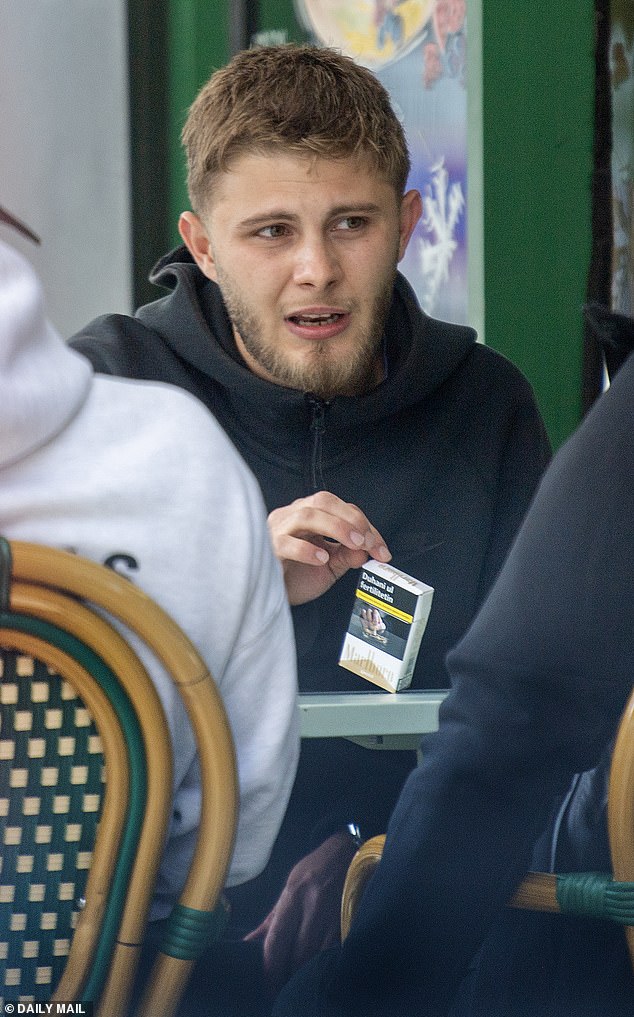
Erik said he was recently arrested by an undercover police officer, who found he had six bags of cocaine. However, the young drug dealer said he was released from jail after two weeks with no charges against him
However, because his phone was taken, his cocaine line broke down and now he’s looking to get back into business.
Posing as a cocaine supplier in a British-Albanian gang, our reporters responded to a message he wrote on the Facebook asking for a job as a bike deliveryman.
It became clear very quickly that he wanted to deliver cocaine. Within a day, he agreed to meet in a west London café. Little did he know that just a few months after being busted by an undercover police officer, he was about to be exposed by two undercover reporters.
Erik is a quintessential Albanian drug dealer: young, motivated, and morally corrupt.
He said many Albanian drug dealers ‘love coming in [small] boats’ but it was ‘risky’ and expensive, so he had opted for a legal route by plane.
He told our reporters he would use Lime bikes to sell cocaine to his line — his posse of customers — around Chalk Farm in north London, where he lives.
Asked how much he was selling before his arrest, he said: ‘Bro, I was moving a lot… I have many friends. I was for two years in Oxford Street, Soho. I used to work in the bars. I started my line in the bars, the nightclubs.
‘It was too busy because it was only me. Sometimes I did £700 a day, £800, £400, sometimes £100 — it’s never the same.
‘I was keeping the good stuff, which is [the] reason I had the good customers.’
He said he shut down his line after the police arrested him and took his phone.
Because of this, Erik said he had stopped drinking to avoid impairing his judgment, and was now only willing to sell cocaine in the day, preferring to use the night to get customers’ numbers for his new line.
He said: ‘I stopped because they took my phone, so I closed everything. It was too risky, because they took my phone under investigation. I was scared to text.
‘My line is f***ed up now. I had one of my friends [helping sustain it]. It’s not easy to make alone.
‘You have to stay outside, in the nightclubs, spending money. It will take time.’
After the meeting Erik, our reporters stopped replying to his messages. Just days later we saw him post his number on Facebook again, hoping for a chance to earn his fortune.
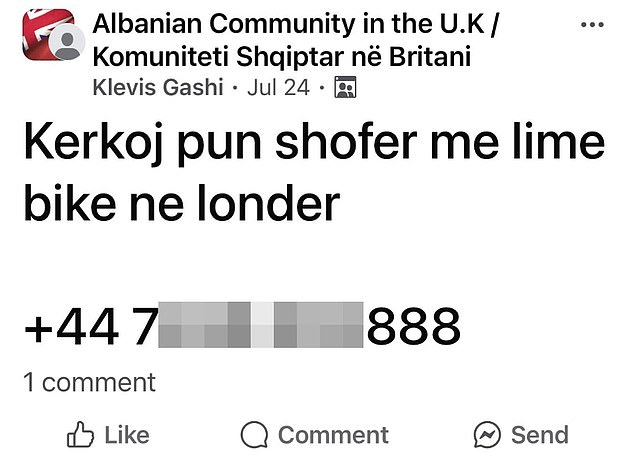
Erik posted his number to the ‘Albanian Community in the UK’ Facebook group in July offering to be a Lime bike deliveryman, but on contacting him, our reporters quickly realised he wanted to sell cocaine
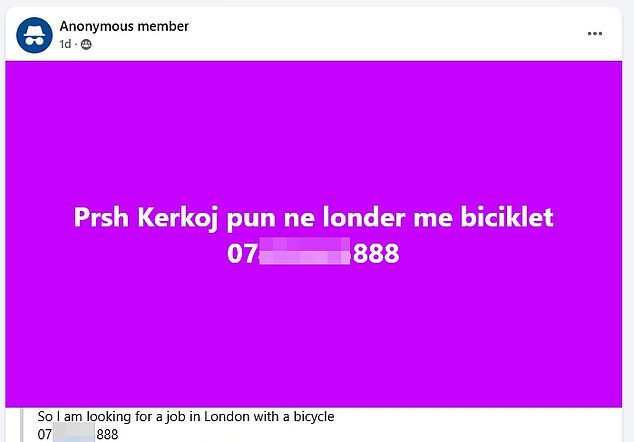
When the Mail stopped responding to his messages, Erik returned to the site and posted his number again
But while dealers like Erik have seemingly arrived legally, other criminals slip in on small boats across the Channel.
After arriving on a small boat, these men are housed in asylum hotels while their claims are processed. The British Establishment trusts they will not leave, but because these people are not prisoners, they are free to walk out whenever they like.
This is exactly what Albanians who want to deal cocaine do, sources familiar with the process told the Mail.
Once they are out of the migrant hotels and living illegally in the UK, they jump on social media, posting about how they want to become ‘drivers’ or ‘bikers’ on Facebook groups for Albanian job-seekers with tens of thousands of members where gangsters have posted adverts for dealers delivering cocaine.
Of course, the word ‘cocaine’ was never used, most likely to avoid automatic bans on social media. Instead, gangs and prospective dealers either use a snowflake emoji or refer to it as ‘pika’, the Albanian word for ‘points’. One point is one gram of cocaine.
When our undercover reporter posed as a gang member, some admitted they were illegal immigrants who came over on small boats and already had experience dealing cocaine in Britain.
One poster introduced himself as Saimir. He said he arrived on a small boat and did not have ‘any papers at all’ that allowed him to stay in the UK.
Keen to sell cocaine, he said: ‘I have done this job in London. I have done stuff like this.
‘What time do I need to start work, and how many points [grams of cocaine] do I need to sell for you?’
Asked how much he was selling before, he said: ’60 to 80, six days a week, 12 hours a day in East London.’
Selling that volume of cocaine in London — 80 grams of cocaine a day for six days a week — would likely rake in around £24,000 a week for a gang.
On the same group, an anonymous poster wrote: ‘Hello. Driver with experience needed in Essex, 7am to 7pm. £300 per day + petrol. Must have your own car. Contact [phone number given] on WhatsApp [snowflake emoji added to signify cocaine.]’
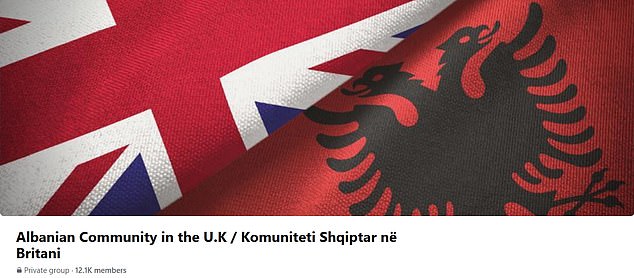
Facebook jobs groups, such as this one with more than 12,000 members, are being used to connect drug dealers with Albanian cocaine gangs
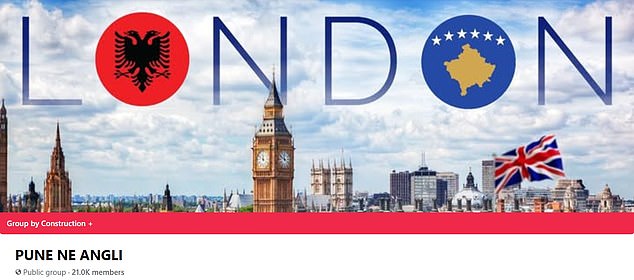
This group, whose name translates from Albanian to Work in England, also has posts from drug dealers. It has 21,000 members
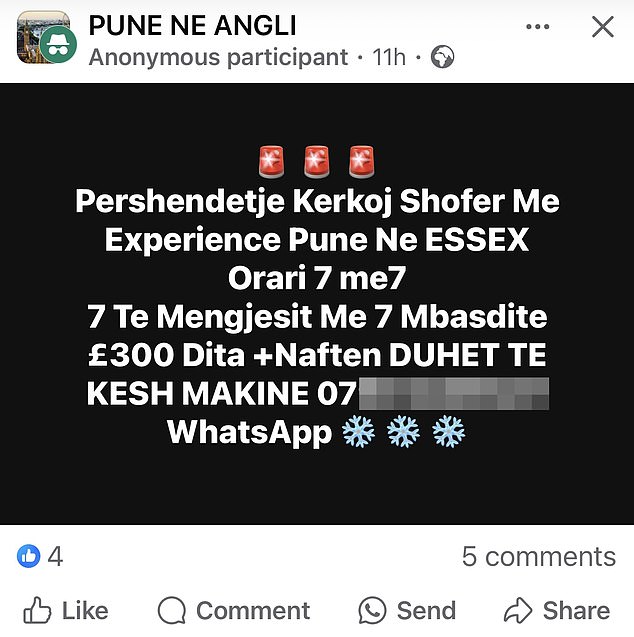
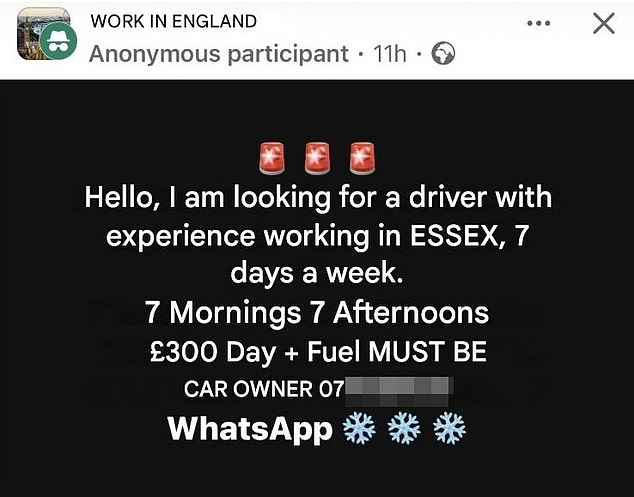
On the groups, Albanian gangsters posted job opportunities offering high rates and often included the snowflake emoji, which is a reference to cocaine
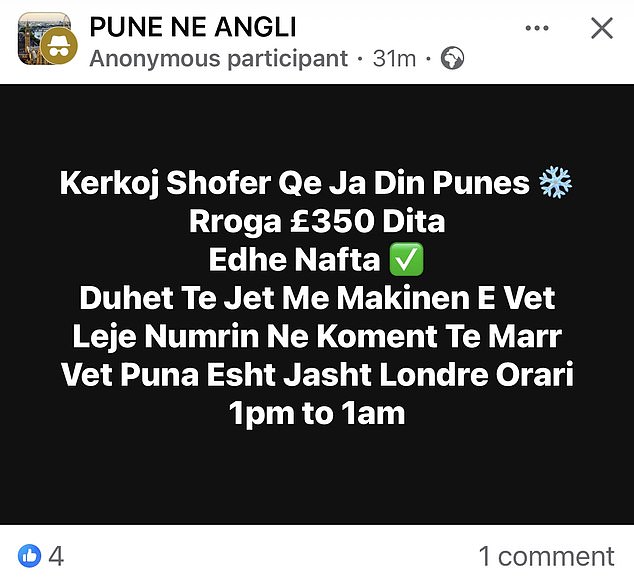
The varied locations of the jobs revealed the Albanian gangs’ domination of the British cocaine market
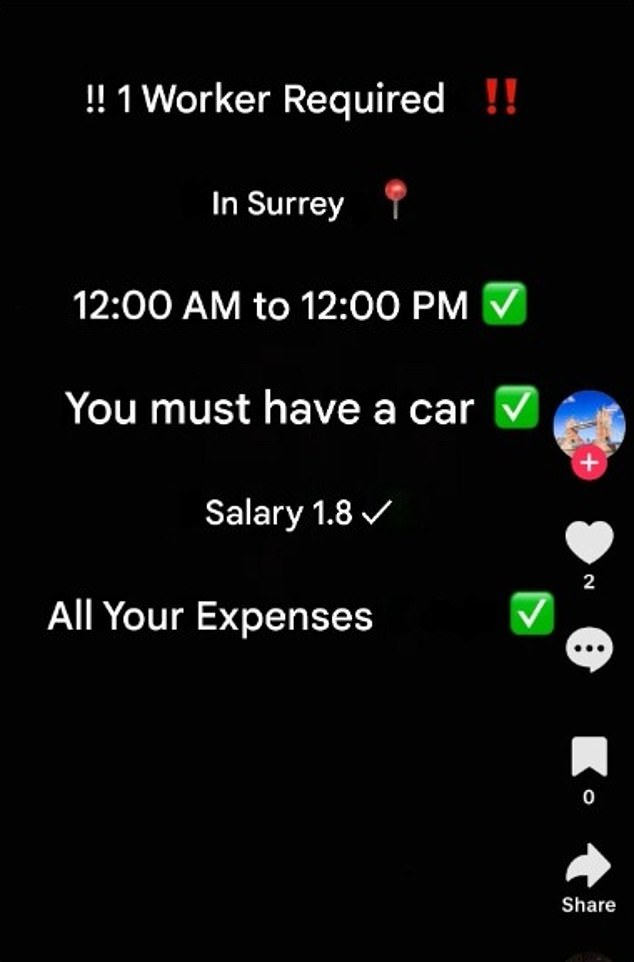
In this TikTok from the ‘Albanian Cocaine’ account, a gangster offers dealers £1,800 a week with all expenses paid to sell drugs
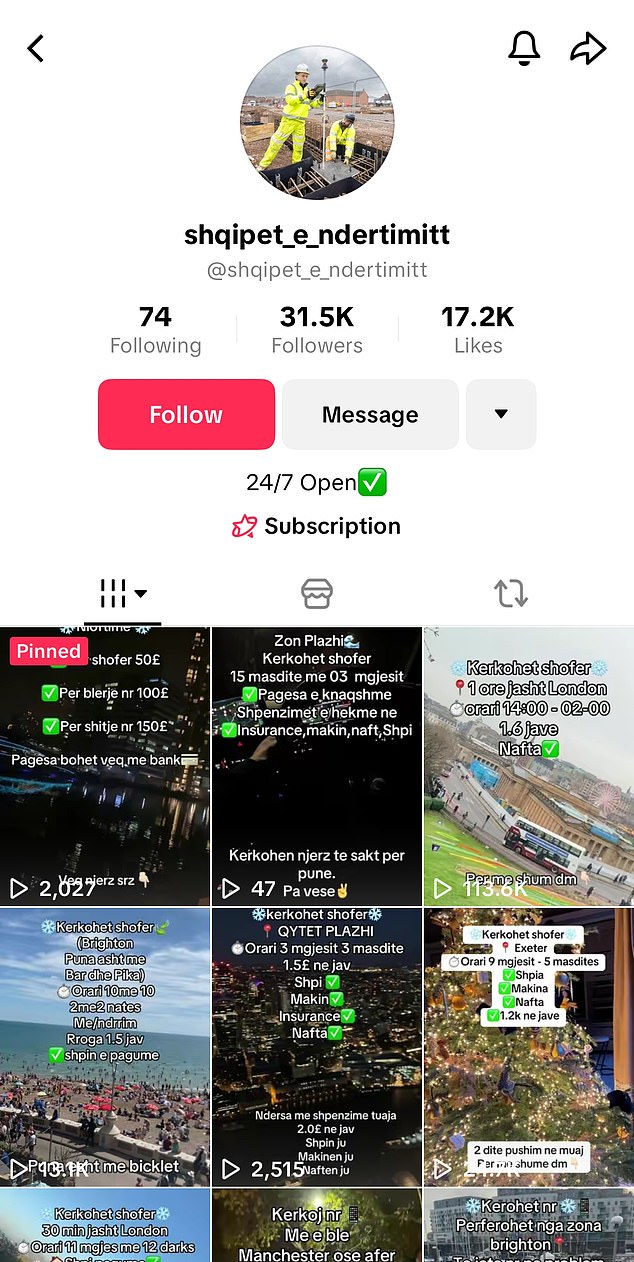
The profile picture for this account shows two builders. However, the posts are almost all adverts for cocaine dealing gigs offering up to £2,100 a week
On a different Facebook group called Pune ne Angli, which translates from Albanian as Work in England, an anonymous poster wrote: ‘+£300 per day. I am looking for drivers [snowflake emoji, used to signify cocaine]. Only serious people. Long-term work. Outside London. If interested, post your number.’
Not all were so open. Another post simply asked for a ‘man with a bike’. The giveaway that it could be related to drugs was the terms of employment: ‘£1,400 per week. Accommodation paid.’
The gangs aren’t just using Facebook. On TikTok, an account called ‘Shqipet e Pikavee’, Albanian slang for ‘Albanian cocaine’, a series of posts called for cocaine dealers, offering salaries of up to £1,800.
Another account name translates to ‘Albanian building’ and has a profile photo of two builders. Yet its posts are almost all job adverts in Albanian for cocaine dealers offering up to £2,100 a week.
After the Mail pointed this out to TikTok, the social media giant removed both accounts.
This method for finding dealers might seem brazen, but bold moves are how Albanians have come to dominate Britain’s market.
Today, the majority of cocaine in Britain is sold by Albanian gangs. But this illicit empire is relatively new — around 20 years old.
In the early 2000s, Albanian gangs saw an opportunity in the British cocaine market. The Albanians had already become important figures in the cocaine trade in countries with major European ports — the Netherlands, Spain, Italy and Belgium — but those nations already had strong mafias controlling the market.
Britain was untapped. In the 1990s, cocaine was the drug of millionaire playboys: it was expensive and, while still addictive, of fairly poor quality.
When Albanian gangs started making forays into Britain at the end of 2000, they had a revolutionary strategy.
Their target wasn’t the rich and famous; it was the middle class. Secondly, unlike the Albanians went straight to the source, making deals directly with South American cartels.
Thirdly, the Albanian gangsters were more violent and more desperate to make money than their British counterparts. They had come from a country with high unemployment rates, low wages, and poor living conditions. This was their chance to make serious cash.
But most importantly, their product was higher quality, more addictive and, the number one priority, it was far cheaper than anything else on the market. Their motto was ‘sell cheap and more’. It was simple economics, and it worked.
Speaking on condition of anonymity, an Albanian organised crime boss from a gang that sold cocaine in the south of England in the 2000s has spoken to the Daily Mail.
He spent 17 years in jail for his crimes, but still gushes about their success: ‘We had the highest purity of cocaine per one gram sold on the street. That made existing users get the drug from us and abandon the existing sellers.
‘That made my organisation the main supplier of cocaine for Portsmouth and Bournemouth.’
But after driving out the competition, Albanian gangs like his one still wanted more.
The Albanian gangster said: ‘In 2009/10, we dropped the price for a kilo of cocaine from £35,000 to £30,000. That was a game changer for the market at that time.’
From 2000 to 2023, the number of British adults who’ve ever taken cocaine doubled from 5.1% of the population to 10.3%. The Albanian gangs are laughing.
A former drug user who is now sober and employed told the Mail: ‘London is a coke capital.’
Asked why the Albanian gangs have such dominance in the UK, he said: ‘One, it’s the quality of the product.
‘I met a drug addict who had had coke psychosis [hallucinations and paranoia induced by heavy cocaine use].
‘He said [the cocaine he took was] ”83% pure shine”, which means exceptionally pure.
‘They also have a monopoly on violence. They’re literally always just f***ing scary, excuse my French.
‘They’re an international organisation as opposed to just local people selling. They also have links to clubs. They’re very much integrated [in the drugs and party scene].’
Albanian mob bosses are lining their pockets with millions as the Establishment’s broken asylum system provides them with boatloads of eager dealers, and South American cartels are only too happy to keep increasing their orders of cocaine.
Where in the UK are Albanian gangs advertising for cocaine dealers?
The Mail has seen adverts for cocaine dealers across the country, from major cities like Manchester and London to areas less commonly associated with drug dealing, such as Cambridge and Bournemouth.
The NCA said last year that the Albanian-linked drugs trade was active across the country in cities, towns and even rural areas.
The agency said Albanian gangs are smuggling ‘hundreds of millions’ in sterling out of the UK each year.
‘Their main objective when they make money is to get it out of the country as soon as possible,’ Steve Brocklesby, Intelligence Manager from NCA said.
‘They will smuggle it out of the UK into Albania in whatever form it comes’.
‘The estimates are that hundreds of millions of pounds UK sterling are leaving the UK and ending up in Albania where it then gets semi-legitimised either into the banking system or to pay for construction work.
‘We also know that Albanians will move UK cash into bureau de change the UK and Europe, change for euros and drive that down to Albania.
‘We can expect to see an increase in use of crypto and other less regulated investments in the UK, as well as direct investments into the UK in the coming years.’
Liverpool is one of the few places the Albanian gangs have left alone. This is likely owing to the reputation of violent British gangsters already controlling the area.
Who’s in these Albanian organised crime gangs?
Below are some of the Albanians jailed this summer for dealing cocaine in Britain.
The maximum sentence for dealing cocaine in the UK is life behind bars, an unlimited fine, or both.
It sounds tough, but in reality, these criminals rarely receive life or even particularly long sentences.
The Daily Mail has analysed the sentences of Albanian cocaine dealers jailed around the UK from June to August this year.
Our research has found 18 such dealers. They are all men between the ages of 20 and 41 who either pleaded guilty to or were found guilty of possession with intent to supply a Class A drug, namely cocaine.
They were jailed for an average of three years and nine months each. That’s the first instance of being helped by the British establishment – low sentences.
Read on to see who exactly they are…
Valentin Roci
Albanian drug dealer Valentin Roci, 27, was deported last year after being caught supplying drugs and entering the country illegally.
This year, he was back in Britain to sell cocaine in Southend after returning across the Channel on a small boat.
In March, he was driving a Ford Mondeo without insurance when the police pulled him over for having a broken brake light. They found him with eight wraps of cocaine (worth around £80), one wrap of cannabis and £1,195 in cash.
Roci pleaded guilty to possessing cocaine with intent to supply, possessing cannabis, possessing criminal property (the cash), driving without insurance and driving without a licence.
During his trial, the judge said Roci’s return to Britain suggested there was a ‘strong economic reason drawing you back’.
He sentenced him to 30 months in prison this August, after which he will be deported for a second time.
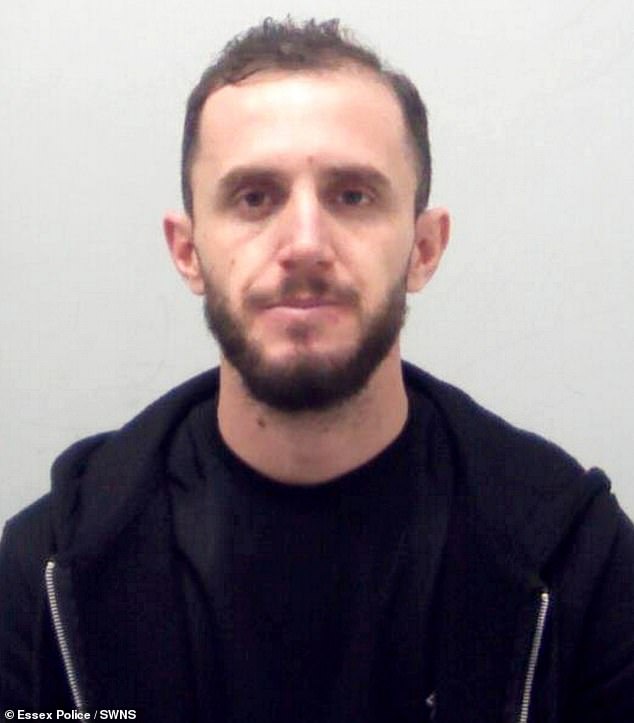
Albanian cocaine dealer Valentin Roci, 27, will be deported for a second time after serving time in jail
Marios Mecani and Xhanluka Duraj
In August, two men suspected of being part of the same gang were jailed for their part in a £50,000 cocaine and cash bust.
Police stopped a car linked to drug dealing in Nottingham and found 24-year-old Albanian Marios Mecani inside, along with deal bags of cocaine and keys to a house.
When officers searched the house, they found £30,000 of cocaine, £20,000 in cash and large quantities of deal bags, which they said pointed to a larger operation.
They also found an ID card of another Albanian man, Xhanluka Duraj, 20. The police found Duraj the next day and after a pursuit he was found with bundles of cash and a phone he had tried to destroy.
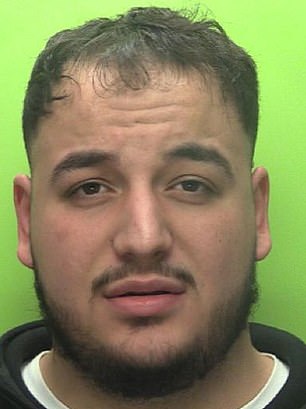
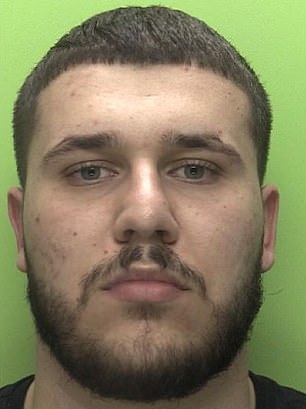
Albanians Marios Mecani, 24, (left) and Xhanluka Duraj, 20, (right) were each jailed for three years and six months for intending to deal cocaine
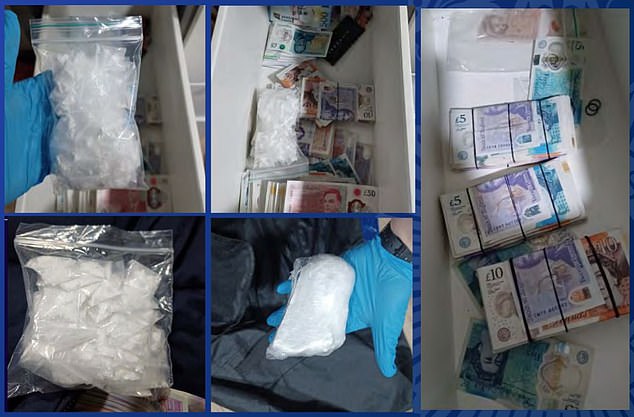
Nottinghamshire Police found £30,000 of cocaine and £20,000 in cash during the huge Albanian gang bust
The next day, on 19 April, reports came in of unknown men entering a student property, and on arrival, Duraj tried to flee the scene.
Following a pursuit, he was detained and searched by police where bundles of cash and a phone he attempted to destroy were seized.
In August, Duraj was sentenced to three years and six months after being found guilty of possession with the intent to supply cocaine and possession of criminal property.
Mecani was also found guilty of possession with the intent to supply the Class A drug and possession of criminal property, and was jailed for three years and six months.
The Denzel gang
Six mobsters from an Albanian organised crime gang working what they called the ‘Denzel’ line in Swindon were jailed last month.
Saimir Neziraj, 32, Nertil Halili, 29, Edmir Beqiri, 37, Ergys Abdyli, 26, Ardian Gjeta, 26, and Jorgo Brachousai, 24, were busted by a police sting six months in the making.
The group, fronted by Saimir Neziraj, controlled a cocaine line which used runners to supply cocaine users across the town.
In the model, Neziraj would collect the cash and restock the drugs line, named ‘Denzel’. Edmir Beqiri would warehouse the cocaine in Swindon and Ardian Gjeta and Jorgo Brachousai would carry out the day-to-day dealing.
On the evening of February 1, 2024, officers observed Neziraj driving to London where, in a quiet cul-de-sac in Barnet, he met with Ergys Abdyli, who was based in London.
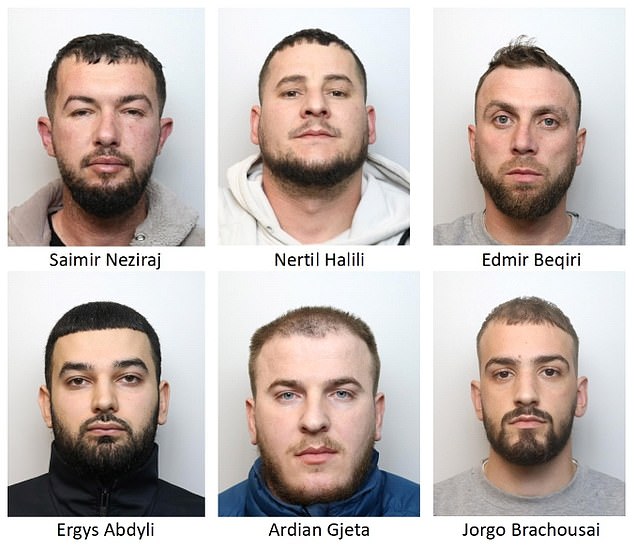
These six gangsters were part of an Albanian organised crime gang selling cocaine across Swindon
Neziraj collected the cocaine from Abdyli, which was then transported back to Swindon and passed on to Beqiri for its safe retention.
Throughout the investigation, the ‘Denzel’ phone was held by Nertil Halili in Derbyshire, where Halili, with the assistance of Neziraj, would arrange the street dealing of the cocaine in Swindon.
In what the police called ‘a huge mistake by the group’, in March 2024, officers watched as Halili and Neziraj met in the West Bromwich area of the Midlands, where the Denzel handset was passed from Halili to Neziraj.
Officers from Wiltshire Police, Derbyshire Constabulary and the Met then carried out a coordinated series of dawn raids in Swindon, Derby and north London during early March 2024.
Large quantities of cash and drugs were seized, and the gangsters were arrested.
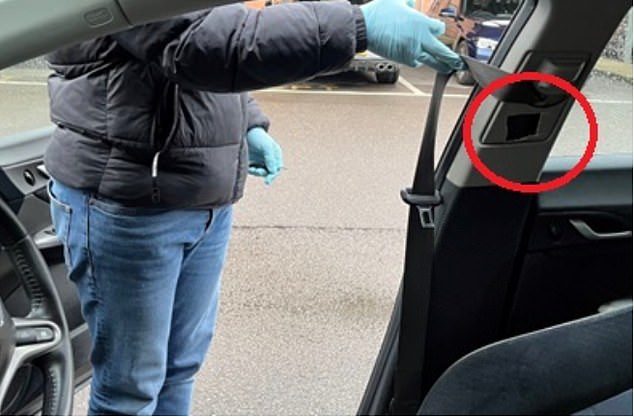
A sock full of cocaine was stuffed in this secret hole (circled) in a drug runner’s car
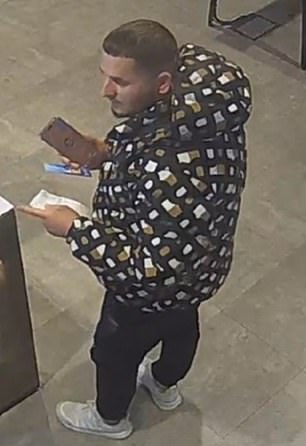
Pictured: Halili topping up drugs in Derby
Neziraj was jailed for eight years for dealing cocaine. Halili, who has already been deported at least once, was jailed for seven years and ten months for the same offence and an additional one of re-entry in breach of deportation order.
Beqiri was given three years and eight months for dealing cocaine. Abdyli received five years and 11 months for dealing cocaine, possession of criminal property, perverting the course of justice and possessing false identification documents with intent.
Gjeta got two years and one month for dealing cocaine and possession of criminal property. Brachousai received a 16-month sentence for dealing cocaine, although this was suspended for two years.
Erion Kakuli
Another Albanian drug dealer, Erion Kakuli, 25, was jailed for five months last year for growing cannabis. In June this year, police spotted him dealing cocaine outside a Lidl in Stoke.
They followed him home, raided his house and foun £4,500 of cocaine and £255 in cash.
Kakuli claimed he only dealt drugs because he owed an Albanian gang money.
Even so, he pleaded guilty to possession with intent to supply cocaine and possession of criminal property and was jailed in August for three years and four months.
It is expected he will be deported after finishing his sentence.
Mirush Sallaj
Albanian drug dealer Mirush Sallaj, 41, was sitting in a Volkswagen Passat in Cambridge when police spotted him.
Officers had realised the car was uninsured and searched it, finding 20 bags of crack cocaine, cash and a mobile phone.
In July, Sallaj pleaded guilty to possession with intent to supply crack cocaine, driving without a licence and insurance.
He was sentenced to two years and three months in prison and was banned from driving for 16 months.
Ermal Halaj
Yet another Albanian drug dealer was jailed this summer after a car chase that led to a pursuit on foot in Benfleet, Essex.
Officers from Essex Police saw a car being driven suspiciously in June. The driver, Ermal Halaj, 23, failed to stop for the police and crashed into a bollard before fleeing on foot.
He was chased down and arrested. He later admitted to intending to deal cocaine and dangerous driving, and was sentenced to two years and ten months in jail.
Once he is released, he will be banned from driving for a year and ordered to pay £228.
Ersid Psyqyli
This Albanian drug dealer was jailed for two-and-a-half years in August after pleading guilty to being concerned in the supply of class A drugs.
Police in Rugby, Warwickshire, spotted 22-year-old Ersid Psyqyli doing loops of roads and exchanging items with people.
When officers searched the room he was renting, they found 40 wraps of cocaine worth around £400 and £228 in cash.
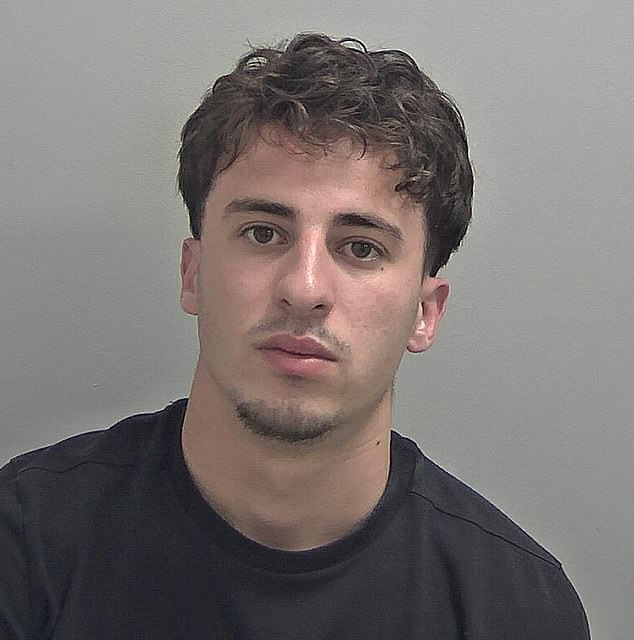
Ersid Psyqyli, 22, was jailed for two-and-a-half years after police officers found 40 wraps of cocaine in his room
Mirgjen Hysa
This is yet another Albanian drug dealer jailed this summer.
When police raided a house in Cambridge, they found 27-year-old Mirgjen Hysa hiding with 27 bags of cocaine, £2,885 in cash, multiple mobile phones and drug paraphernalia, including scales and deal bags.
He was jailed in August for two-and-a-half years after pleading guilty to possession with intent to supply cocaine and failing to surrender to police bail.
Hile Marashi
Albanian drug dealer Hile Marashi, 37, was part of an organised crime gang peddling cocaine in Aylesbury, Buckinghamshire.
He was stopped by police while driving his white Mercedes A-Class. Officers found 20 bags of cocaine and £245 in cash beside his car.
The drugs, worth £800, were destroyed and the cash was kept by police, who also retained his Mercedes, either for auction or destruction.
Marashi was jailed for three years and banned from driving for 33 months.
Edrilon Gjoni
On 24 May 2025, a Black Audi A5 was stopped by the Sentinel West team on the Suffolk/Cambridgeshire border at Newmarket on the A142. Albanian man Edrilon Gjoni, 22, was inside.
Mobile phone evidence gave officers the grounds to arrest Gjoni on suspicion of being concerned in the supply of class A drugs.
Following his arrest, a search took place at a property in the Cambridgeshire area, where a little over a kilo of cocaine was located with an estimated street value of £105,000, along with £6,000 in cash.
Sergeant George Laflin said: ‘Gjoni had become an established player in the distribution of Class A Drugs within Suffolk and Cambridgeshire. Due to the overwhelming evidence presented at court, a guilty plea was entered at the earliest opportunity.’
Gjoni was jailed for five years and three months in July for possession with intent to supply class A drugs.
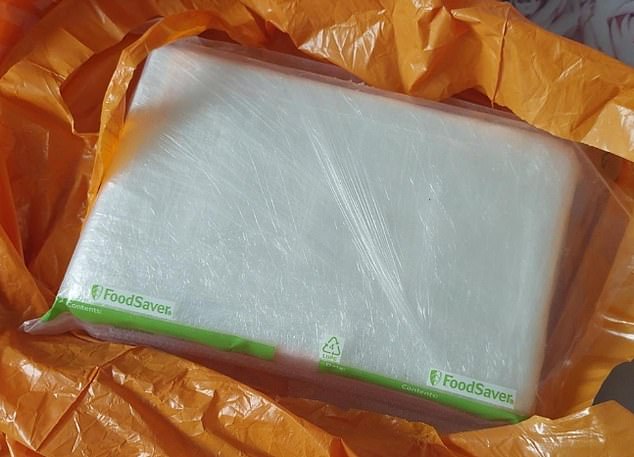
Police found just over a kilo of cocaine inside a vacuum-sealed bag with an estimated street value of £105,000
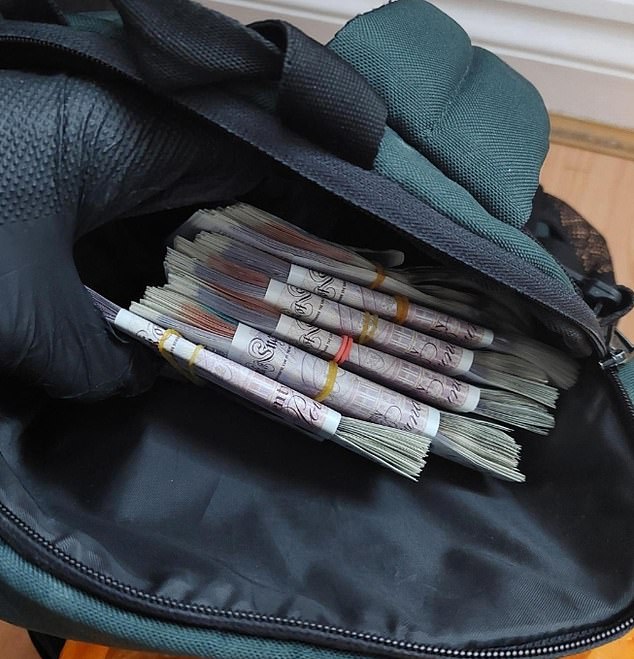
Police officers raiding the house also found a bag stuffed with cash amounting to £6,000
The Mario gang
Albanian drug dealers Klevjan Beraj and Erlin Murataj, both 26, were jailed for supplying cocaine to Warwickshire through what they called the ‘Mario’ line.
Police had identified a house in Rugby that they thought could be used for drugs. When they stormed it in June, they arrested four people and seized £60,000 of drugs.
Beraj was charged with possession of cocaine and cannabis with intent to supply and being concerned in the supply of cocaine. He was jailed for five years.
Murataj was charged with possession of cocaine and cannabis with intent to supply and was jailed for three years and two months.
A third man whose nationality is unkown, also from Rugby, was charged with possession of cannabis with intent to supply. He was jailed for nine months.
Why is Britain so weak that when judges deport drug dealers, they can return to commit the same crimes they were booted out for in the first place?
The second instance of Albanian gangs being helped by the British establishment is in how easy it is to slink back into Britain. When these criminals are released, often midway through their sentences, many of them are deported.
Britain’s new Home Secretary, Shabana Mahmood, said this month that countries which refuse to take back migrants who fail asylum claims could face curtailed access to visas as punishment.
Announcing the threat, she said: ‘This sends a clear message to anyone seeking to undermine our border security. If you have no legal right to remain in the UK, we will deport you.’
What she didn’t mention is that the prime example of such an existing return deal is the one the UK has with Albania.
It’s true, Albania does take back failed asylum seekers and the rate of Albanians coming across the Channel has fallen.
But if an Albanian comes to Britain to be a drug dealer, he’s unlikely to wait around for the Home Office to come calling.
If they’re caught flouting a deportation notice, they may well be jailed of course, where they can meet all the other jailed Albanian criminals.
Albanians remain the largest nationality of prisoners in the UK after Britons. As of this August, there are 1,193 jailed for crimes including drug dealing, murder, people smuggling, money laundering and sex offences.
It is thought to cost around £40,000 a year to house each prisoner, which means the UK is spending approximately £47million on keeping Albanian criminals locked up.
But as Valentin Roci showed, some criminals jump straiught back on a boat back to Britain.
Many criminals are thought to be in a recurring cycle of being arrested, deported and returning to the UK to commit the same crimes.
It’s a problem judges are facing up and down the country, and not just for Albanian cocaine dealers.
Career thief Cristian Chiriac, 31, from Romania, has entered Britain at least eight times illegally.
He’s been convicted of crimes in the UK at least six times, in general receiving tougher sentences each time.
In August 2024, he was sentenced to ten months in jail, eligible for parole after five, at which point he would be deported again.

Responding to our undercover investigation, Shadow Home Secretary Chris Philp (pictured) said: ‘This is a damning indictment of Labour’s failure to maintain law and order, organised crime gangs are operating so brazenly they are rubbing our noses in it via social media’
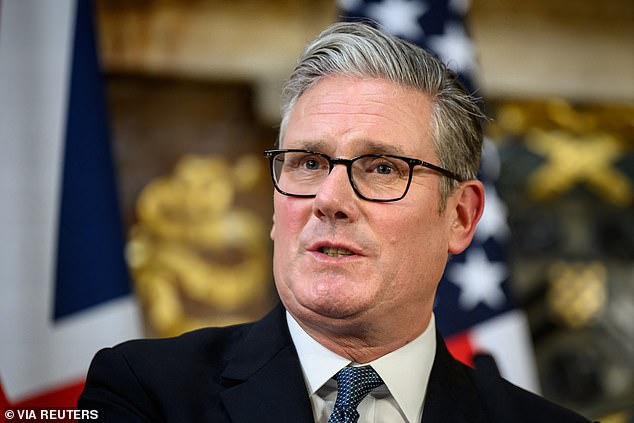
The Prime Minister’s past as a human rights lawyer is continuing to bite him when it comes to dealing with organised crime and the asylum system
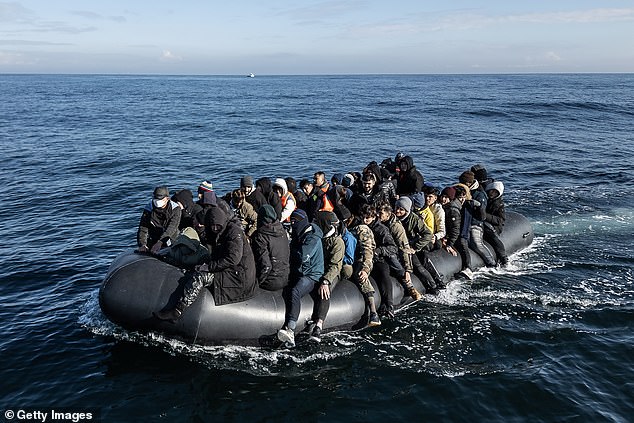
One way Albanian criminals reach the UK is by small boat, even if they’ve already been deported before. Pictured: Migrants crossing the Channel last year
Before he was sentenced, the judge told him: ‘You are in a constant cycle of re-offending.
‘Clearly, the length of the sentences passed has no deterrent effect whatsoever.’
However, despite acknowledging that the length of sentences was not a deterrent, she proceeded to sentence Chiriac to a longer one of ten months, adding: ‘The sentences will only continue to get longer and longer.’
What this means for Albanian gangs in Britain is that their supply of eager drug dealers is hardly at risk.
Some people can avoid deportation by claiming it would go against their fundamental rights under the European Court of Human Rights (ECHR), usually in terms of Article 3 (prohibiting torture) and Article 8 (the right for private and family life).
But even if they get deported, they can come back. One of the easiest ways for a criminal to slip into Britain is by taking a small boat to Dover, getting housed in an asylum hotel and then walking out of the front door.
They can also smuggle themselves in cars and lorries coming into Britain or, as was the case with Erik the Albanian drug dealer our undercover reporters spoke to, they can jump on a plane to the UK.
George Keppe was a criminal solitictor for 46 years. He told the Mail the cycle of criminals returning to the UK has been going on for more than a decade.
He said: ‘It will continue to happen. The lack of finance and manpower at the borders and the police [means] these people take advantage.
‘The police and judges are handcuffed. They can only deal with what they are presented with.
‘The police and judges can express their concern but it’s going to keep happening until there are fundamental changes.
‘The ECHR, visual recognition, ID cards — all combined they might have some sort of effect.
‘How often do you hear judges say, ”It’s with regret that I can etc.” It’s not the fault of the judges or the police, it’s the fault of the legislation.
‘You hear the politicians saying, ”We have done this and that,” but for all intents and purposes, f*** all has been done.
‘Most people think we are a laughing stock. A fundamentally rotten scenario needs fundamental changes.’
So what’s next?
For years, the NCA has warned about the ‘significant threat’ posed by Albanian gangs.
There are squads of officers hunting these criminals, and last year the agency signed a deal with Albania’s anti-organised crime bureau, SPAK, that will see the unit hunt for the assets of Albanians convicted in the UK.
In response to the Mail’s investigation, a Home Office spokeswoman said: ‘We will not allow our asylum system to be exploited by those who endanger others or undermine community safety.
‘We are targeting Albanian gangs through tougher enforcement, faster removals and investing in targeted law enforcement capabilities to disrupt online gang operations. We are also working with tech firms to shut down criminal activity online through the Online Safety Act.’
The Metropolitan Police refused to comment, but an NCA spokesman said: ‘Many organised crime groups selling drugs use social media and communication platforms to promote and sell their illicit produce.
‘The NCA is working with partners across law enforcement and government to tackle drug trafficking.
‘Social media and technology companies also need to work to ensure that crime networks are stopped from being able to exploit their sites and platforms for criminal gain. Technology companies, including social media platforms, have a responsibility to create the safest possible environment for their customers by not enabling criminality such as drug trafficking.
‘We continue to work with the technology industry to enable law enforcement to identify offenders who exploit the platforms for criminal gain, and to protect the public.’
But for now, whether the authorities are chasing these criminals or not, we are living under a British establishment that keeps on letting gangsters back in, and in a political environment where no one is offering a plausible deterrent.
However they get here, their mission is simple: sell hard drugs to British people, which in turn brings violence to our streets as organised crime gangs fight to keep their lucrative industry alive.
So while cases such as the migrant who sexually assaulted a 14-year-old schoolgirl this summer understandably take the limelight, thousands of migrants are coming here for a different reason.
It’s still an attack on the Britain we know and love, and it’s still putting your children in danger. But the difference here is that these thousands of illegal migrants can’t be swept away as a few rotten apples.
This is a concerted effort by Albanian gangs to use Britain’s broken asylum system to flood the UK with cocaine.
Meanwhile, although Facebook and TikTok were created to connect friends and bring joy to people, now they connect drug dealers selling cocaine steeped in the blood of addicts and gangsters alike.
Even more shockingly, it’s all in plain sight on a platform that 13-year-olds can, and regularly do, use.
After the Mail pointed out the existence of TikTok accounts advertising drug dealing jobs, the social media giant said: ‘We do not allow content that promotes illegal activities, including the trade of drugs on our platform. Content that shows or encourages illegal acts, such as drug-related activities, will be removed.
‘We have permanently banned these accounts for violating these guidelines. We have tens of thousands of talented safety professionals dedicated to keeping TikTok safe. To support our global platform, our local experts speak more than 70 languages and dialects, including Albanian.’
TikTok claimed that in the first quarter of this year, it removed more than 96% of content that showed violent behaviours and criminal activities before it was reported to them.
Facebook has not banned the groups mentioned in this article but is now investigating them as a result of our exposé. The social media platform did not respond to a request for comment.
Finally, although the Prime Minister is tasked with getting a grip on this chaos, Sir Keir Starmer’s past as a human rights lawyer is continuing to bite him when it comes to dealing with organised crime and the asylum system.
All it means for now is that greedy dealers like Erik will continue to make a mockery of the UK’s justice system by selling drugs and consolidating the Albanians’ great cocaine empire in the heart of Britain.












